|
|
|
Sort Order |
|
|
|
Items / Page
|
|
|
|
|
|
|
| Srl | Item |
| 1 |
ID:
089539


|
|
|
|
|
| Publication |
2009.
|
| Summary/Abstract |
The thrust of the article is to investigate the reasons for the ambiguous character and results of the ENP. The argument is that these are a result of tensions inherent in the discourses produced at various sites in the EU that are involved in the development and implementation of the Policy. These tensions result in the simultaneous construction of mutually exclusive types of borders at the external edges of the EU. The main contribution of the present study to this argument is the detailed empirical evidence it provides for these tensions through the examination of the discourse of the European Commission. The article introduces the concept of soft/ hard borders as a very good analytical tool for studying the ENP and conducts a double-reading of the major types of Commission documents related to this Policy. The main finding is that at present some of the main hurdles the ENP is facing are a result of insufficient transformation of the assumptions and routinised practices that guide policy-making. These lead to underlying themes in Commission discourse that preclude the establishment of the necessary soft external border for the EU. Instead they promote the construction of more traditional hard borders.
|
|
|
|
|
|
|
|
|
|
|
|
|
|
|
|
| 2 |
ID:
089537


|
|
|
|
|
| Publication |
2009.
|
| Summary/Abstract |
This paper approaches intimacy as a site of geopolitical practice. What happens when the body is the territory through which geopolitical strategies are played out? In the Leh district of India's Jammu and Kashmir state Buddhist/Muslim conflict is articulated at the site of the body and geopolitical strategies impinge on personal decisions. Over the past century religious identity has increasingly taken on political meaning in Leh, particularly since the 1980s. Interestingly, for average Ladakhis political conflict is described in terms of bodies - that is, through discussions of who should or should not eat together, get married, or have children. By destabilising the global geopolitical scale, we can arrive at a richer and more nuanced understanding of the everyday ways in which our bodies are incorporated into or reject incorporation into geopolitical strategies to control territory.
In the past, the Buddhists were more. Now, it's the Buddhists, mostly, I think, who have used family planning. Among the Shia Muslims, if you look in Kargil and Chushot, even now, they have nine each or eight each. Rinpoches say that our Buddhists are getting fewer, and then our Hill Council, in the future it's going to be run by Shia Muslims. What the Buddhist Association did, it said to all the Buddhists, "You should think. Up to four, or up to six, or up to five, let them be born. Don't sterilize after two." (Yangdol, 45-year-old Buddhist mother of three)1
In the beginning, in the very beginning, the relationship was very good. We were like one person. There were Buddhists who married with Muslims, and Muslims who married with Buddhists. Now, times have changed, and things are different. Now people don't understand, and they have bad hearts. (Razia, 45-year-old Sunni mother of two)
|
|
|
|
|
|
|
|
|
|
|
|
|
|
|
|
| 3 |
ID:
089547


|
|
|
|
|
| Publication |
2009.
|
| Summary/Abstract |
Norway's "Government Pension Fund" - Global (GPF-G) is large (around $400b), portfolio oriented and transparent. It tries to be ethical and has been mooted as a role model for other SWFs. The way the GPF-G is set up undergirds the US vision of a financialised world economy and it even indirectly supports US warfare in Iraq by buying treasury bills. It is also a leader in ethical investments - more than 20 private funds piggyback any divestment decision the GPF-G makes. Understanding the international implications of the GPF-G does not, however, amount to an explanation of why this vehicle was created. This article puts forward the argument that if we want to understand why and how these diverse behaviours cohere into a larger strategic whole, the fund must be interpreted as the continuation and technocratisation of a long established corporatist tradition of foreign economic policy that Peter Katzenstein more than 25 years ago labelled a strategy of flexible adjustment and domestic compensation.
|
|
|
|
|
|
|
|
|
|
|
|
|
|
|
|
| 4 |
ID:
089540
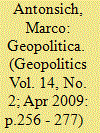

|
|
|
|
|
| Summary/Abstract |
Very few contributions have been published in English on the Italian geopolitical tradition of the interwar years. This is rather surprising, given the fact that, after Geopolitik, Italian geopolitics was one of the largest and most significant in Europe. This article aims to fill this void, by offering a detailed and critical investigation into this intellectual production. Although the article traces the origins of Italian geopolitics back to the 1920s, its main focus is on Geopolitica (1939-1942), the journal which, more than any others, embodied the attempts to give Italy its own geopolitics. Despite its ambitious proposal to become the 'imperial-geographical consciousness' of the Fascist regime, Geopolitica remained largely confined within the circle of academic geography and ultimately also failed to influence the development of Italian geographical tradition.
|
|
|
|
|
|
|
|
|
|
|
|
|
|
|
|
| 5 |
ID:
089541
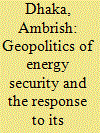

|
|
|
|
|
| Publication |
2009.
|
| Summary/Abstract |
Eurasian Geopolitics as explained in the Heartland model has been reincarnated as Energy Geopolitics. Germany and India are the two strategic economies of the Inner Crescent of Mackinder's 'Heartland' Model and are largely similar in geopolitical focus to the rest of Eurasia. The article argues that in the coming decades at least, Russia will play an important role in these countries' energy vision. A similar unique convergence of goals regarding energy technology requirements will also be seen in the coming decades. India cannot abandon the developmental needs of its one billion plus people to the energy monopolies. Neither does Germany as a significant global economy wish to hang its globalisation efforts on similar energy uncertainties. Both countries therefore seek to spread their energy security through technology-centred geopolitical pluralism. Central Asian energy resources thus seem to be a geopolitical temptation that both nations find hard to ignore. Geopolitical contingencies, it is argued, might bring them together to explore a mixed set of options under some kaleidoscopic combination of an altogether new energy vision.
|
|
|
|
|
|
|
|
|
|
|
|
|
|
|
|
| 6 |
ID:
089542
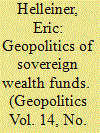

|
|
|
|
|
| Publication |
2009.
|
| Summary/Abstract |
At the centre of the globalisation trend of the past few decades has been the creation of a global financial marketplace in which enormous sums of money came to be traded across the world unencumbered by capital controls.The future of this free wheeling, liberal international fenancial order is now in doubt.The most obvious challenge comes the global financial crisis that began in 2007, a crisis that is prompting governments everywhere to reconsider their commitment to deregulated finance.
|
|
|
|
|
|
|
|
|
|
|
|
|
|
|
|
| 7 |
ID:
089549
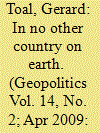

|
|
|
|
|
| Publication |
2009.
|
| Summary/Abstract |
The 2008 United States presidential election compaign presented a sharp contrast in the study of political discourse.The Democratic Party was represented by a candidate who owed his meteoric Political rise to his remarkably skillful and inspiring plitical oratory.
|
|
|
|
|
|
|
|
|
|
|
|
|
|
|
|
| 8 |
ID:
089546
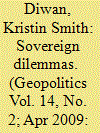

|
|
|
|
|
| Publication |
2009.
|
| Summary/Abstract |
While the countries of the Gulf Cooperation Council (GCC) can claim over half of SWF assets globally, the largest and most strategically important state, the Kingdom of Saudi Arabia, has heretofore lacked a dedicated investment fund. This paper challenges some of the conventional wisdom on SWFs in explaining the Saudi government's reticence to launch an SWF and its recent decision to cautiously move in this direction. First, while Washington policy makers raise fears of enemies using SWFs against US interests, Saudi foreign assets have been used in support of its continuing alliance with the United States. And second, while critics decry the lack of transparency of SWFs, the Saudi launch of a new SWF could represent a move toward greater transparency, by working to separate "private" sovereign funds from "public" ones. Indeed, the launch of a SWF fits into a broad pattern of reforms rationalising Saudi governing institutions as King Abdullah has moved to control spendthrift princes, to streamline decision making, and to attract more foreign investment.
|
|
|
|
|
|
|
|
|
|
|
|
|
|
|
|
| 9 |
ID:
089543
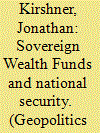

|
|
|
|
|
| Publication |
2009.
|
| Summary/Abstract |
Concerns have been raised that Sovereign Wealth Funds (SWFs) might be used by governments to advance international political goals, raising red flags about their possible economic and national security consequences. These concerns are overstated. Warnings about national security threats related to foreign investment have been sounded repeatedly throughout history, but they have invariably been false alarms. Although there are novel attributes about SWFs in contemporary world politics, establishing their national security consequences is much more difficult than it might seem. And in those instances where theoretical connections between SWFs and "high politics" can be established, on closer inspection the SWFs appear to be intervening variables - manifestations of other pathologies - rather than the root cause of the postulated problem. The potential geopolitical problems caused by SWFs are the result of shifts in wealth in the international system, and not by the establishment or functioning of wealth funds.
|
|
|
|
|
|
|
|
|
|
|
|
|
|
|
|
| 10 |
ID:
089544
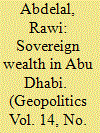

|
|
|
|
|
| Publication |
2009.
|
| Summary/Abstract |
By the turn of the century, oil had already made the tiny emirate of Abu Dhabi rich beyond anyone's wildest dreams. A sovereign wealth fund, the Abu Dhabi Investment Authority (ADIA), has invested extra oil revenues abroad for more than thirty years and amassed a still-growing portfolio worth approximately $750-900 billion. ADIA is widely believed to be the world's largest sovereign wealth fund - indeed the world's largest institutional investor. But Abu Dhabi is not yet a "developed" economy. So, in 2002, the Mubadala Development Company was established as a government-owned investment vehicle. Unlike ADIA's mandate to build and manage a financial portfolio, Mubadala's charge was to develop Abu Dhabi. According to some observers, ADIA was a "sovereign savings fund," while Mubadala was a government-owned investment firm. Mubadala is supposed to invest the wealth of the emirate in activities that would diversify the economy away from energy and into industry and services. Although each Mubadala investment is supposed to earn large returns, the strategy balances financial against "strategic" returns. ADIA and Mubadala are the institutional architecture to manage the wealth of the Abu Dhabi sovereign.
|
|
|
|
|
|
|
|
|
|
|
|
|
|
|
|
| 11 |
ID:
089545
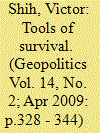

|
|
|
|
|
| Publication |
2009.
|
| Summary/Abstract |
The rise of sovereign wealth funds (SWFs) as major investors in the global economy has raised worries that they serve the geopolitical ends of owner countries. However, given the paramount importance of surviving domestic political competitions, SWFs are likely also tools of domestic political survival. In examining the corporate governance and underlying political environment in which SWFs in Singapore and in China operate, this paper further examines the role of political unity in directing SWF behaviour in authoritarian regimes. The main finding is that a highly unified autocracy is more likely to direct SWFs to maximise long-term profit, while a fragmented one like China is more likely to treat its SWF as an arena for domestic political and bureaucratic infighting. SWFs operating in a fragmented regime are unlikely to make long-term profit and foreign policy objectives top priorities, and their behaviour can be highly unpredictable.
|
|
|
|
|
|
|
|
|
|
|
|
|
|
|
|
|
|
|
|
|